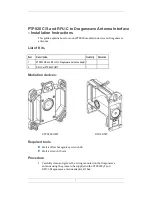
4
SPECIFICATIONS
GNSS-501
GNSS-502
GNSS-503
Radio Frequency
Pass band (typical)
Upper passband
Lower passband
L-Band
1588.5 ±23.0 MHz
1545.0 ±20.0 MHz
1578.0 ±33.0 MHz
1220.0 ±31.0 MHz
1577.5 ±32.5 MHz
1232.0 ±68.0 MHz
Out-of-band rejection (typical)
band edges ±50 MHz
band edges ±100 MHz
15 dB
25 dB
15 dB
25 dB
15 dB
25 dB
Gain at zenith (
= 90°) (minimum)
L1/B1/E1/G1/L-Band
L2/B2/E5b/G2
L2/B2/E5a/E5b/G2
L5
E6
+4.0 dBic
+4.0 dBic
+3.5 dBic
+4.0 dBic
+3.5 dBic
+2.5 dBic
+1.0 dBic
Gain roll-off (zenith to horizon) (typical)
Upper passband
Lower passband
L-Band
12 dB
12dB
12 dB
13 dB
12 dB
12 dB
13 dB
12 dB
LNA gain (typical)
L1: 29 dB
L1: 34 dB
L2: 38 dB
L1: 34 dB
L2: 38 dB
L1-L2 differential propagation delay
(maximum)
–
7 ns
7 ns
Polarization
Right-hand circular
Noise figure (typical)
2.5 dB
Nominal impedance
50
VSWR (typical)
2.0
Power
Input voltage
+3.3 to +18.0 VDC
Current
20 mA (typical)
Environmental
Operating temperature
-40°C to +85°C (-40°F to +185°F)
Storage temperature
-55°C to +85°C (-67°F to +185°F)
Random Vibration (operating)
MIL-STD-810G(CH1), 514.7 (15 g) Annex E Procedure 1,
Category 24
Shock
MIL-STD-810G(CH1), 516.7 (40 g) Procedure 1
Bump
IEC 60068-2-27 Ea (25 g)
Salt Fog
MIL-STD-810G(CH1), 509.6
Water/Dust Resistance
IP67, IP69K























